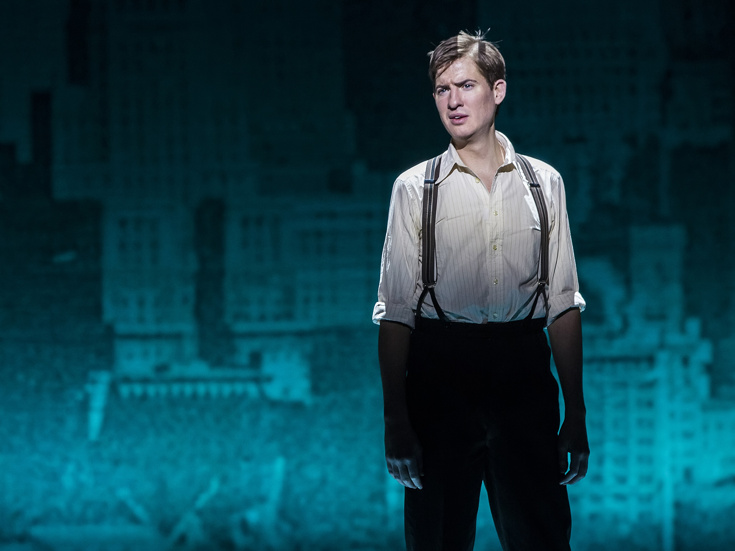Breakfast at Tiffany's Star Matt Barber on the Lack of Nudity in His West End Debut & Catching Up with Downton Abbey Co-Star Lily James

(Photo: Sean Ebsworth Barnes)
Breakfast at Tiffany’s is rarely long absent from the stage, or so it seems. Recent London and New York productions in 2009 and 2013 are now followed by yet another incarnation of the classic Truman Capote tale, this one starting previews June 30 at the Theatre Royal, Haymarket. Pixie Lott inherits Audrey Hepburn’s 1961 screen role as Holly Golightly, with Downton Abbey alumnus Matt Barber as the young writer who falls under her spell. Broadway.com caught the engaging Barber for a chat while he was driving to an evening performance during the show's pre-West End tour.
How does is feel to be a part of such a time-honored title as Breakfast at Tiffany’s?
It’s a fantastic, astonishing opportunity for me as an actor. I get to play these two characters side by side [at different points in the writer Fred’s life] and literally stepping between them mid-sentence so that you see [Fred] 15 years further down the line when he’s established and has had success and made a bit of cash and also when he’s young and unformed, like a sort of grasshopper.
Are you excited to make your West End debut?
Absolutely! Even having done Downton Abbey, this feels like a new pinnacle: the opportunity to play a lead onstage and particularly at the Haymarket, which is such a beautiful place. It sort of leaves me speechless.
How are you, an Englishman, coping with a demanding American accent?
Well, this guy is from the South, for sure, but I’m certainly not hitting up the southern accent too heavily. My feeling is that for an English audience that would be just another obstacle. My interest, in any case, is more in the types of characters and how they sound rather than where they’re actually from. I remember at university people’s accents changing from when they started [college] to when they finished.
Previous stage versions of this story have featured onstage nudity.
We’ve got a bathtub scene as well, but it’s bloody quick and it’s not about getting naked. If you go that route, then that becomes the thing everyone remembers and talks about. This isn’t like [the Peter Shaffer play] Equus, where you can’t get away with not doing [stage nudity] because it’s a fundamental part of the story; here, you can deal with it with a bit of smoke and mirrors, and the audience experience is exactly the same.
What do you find intriguing about your character’s dynamic with Holly?
The thing with Fred is that he desperately wants to be at the center of his own story, but whenever Holly’s around, he just can’t be because she’s so much more everything than he could possibly be.
It’s funny you call him Fred because, in the 2009 London production, he went by the name of William.
They must have made the choice to give him an identity in exactly the same way that we sort of haven’t. I think we decided that we might as well call him Fred because that’s what everyone else calls him: the key point is that he knows who he is, especially once he’s older.
This is a different text from that earlier London staging: you’re using the Richard Greenberg version that was seen on Broadway on 2013.
We’ve also done a lot more work on the text, not to mention that we will have had 14 weeks on tour before we hit London. I feel like the difficulty is staying true to Truman Capote’s book while still turning it into a play. The book is very wordy, very descriptive, and we’ve really tried to strip it back so that the story is as clear as possible.
It’s no secret that you’re playing a version of Capote himself.
Very much so. This is really Capote writing about his younger self—this young writer who hasn’t had any success and doesn’t know where his sexuality sits and is caught up in this massive explosion of life, which is the girl who lives downstairs.
Which brings us to your leading lady, Pixie Lott, in a role immortalized onscreen by Audrey Hepburn.
The thing with Pixie is that she’s got obviously the star quality you need to draw upon in a role like this, which is that she is completely intoxicating for any male that comes anywhere near her. You need somebody who has this quality that when they walk into a room, all heads turn—it’s like in Downton Abbey when the cameras went on Lily James [as Rose] and I found myself next to somebody you might link to Marilyn Monroe or, indeed, Hepburn.
Lily James will be appearing minutes away from you throughout the summer in Romeo and Juliet. Will you be hanging out between shows?
Well, all that was rather a long time ago, and I haven’t actually spoken to [James] in a while, but I’m looking forward to catching up with her.
What about the legacy for you of Downton, in which you played the aristocratic Atticus Aldridge?
That was an incredible experience and it remains an incredible experience even though it’s over. Everyone was working very hard and at the top of their game. That said, it’s not as if I was suddenly swamped by people as a result of it; it wasn’t a significant profile-builder in that way. The benefit was far more just from the job and the experience.
Still, you must feel as if your career is well on its way.
Well, I’d love to feel as if I was even off the starting block, to be honest with you. But I’m absolutely adoring now being onstage and feel as if I want to do a healthy mix of everything.